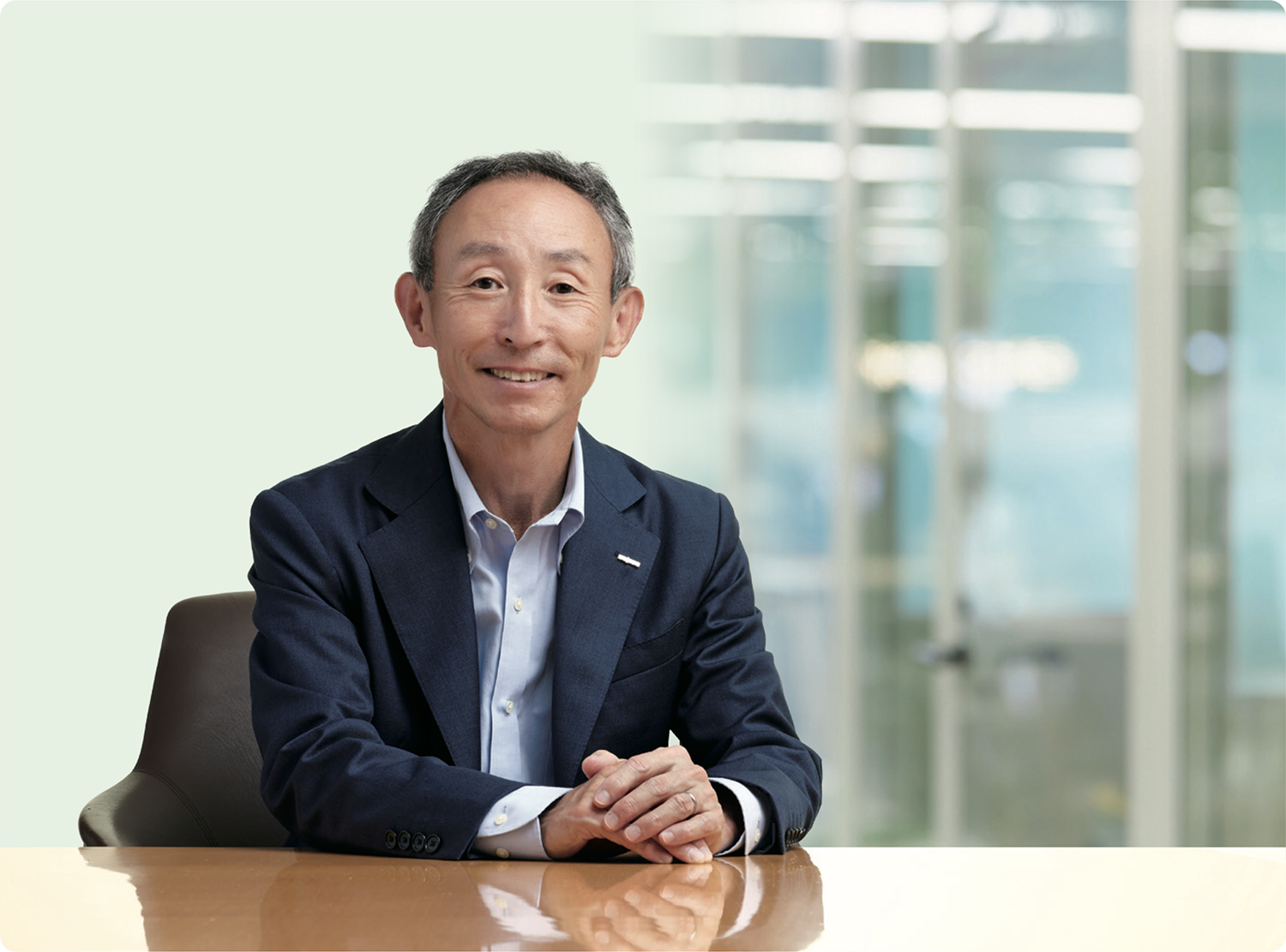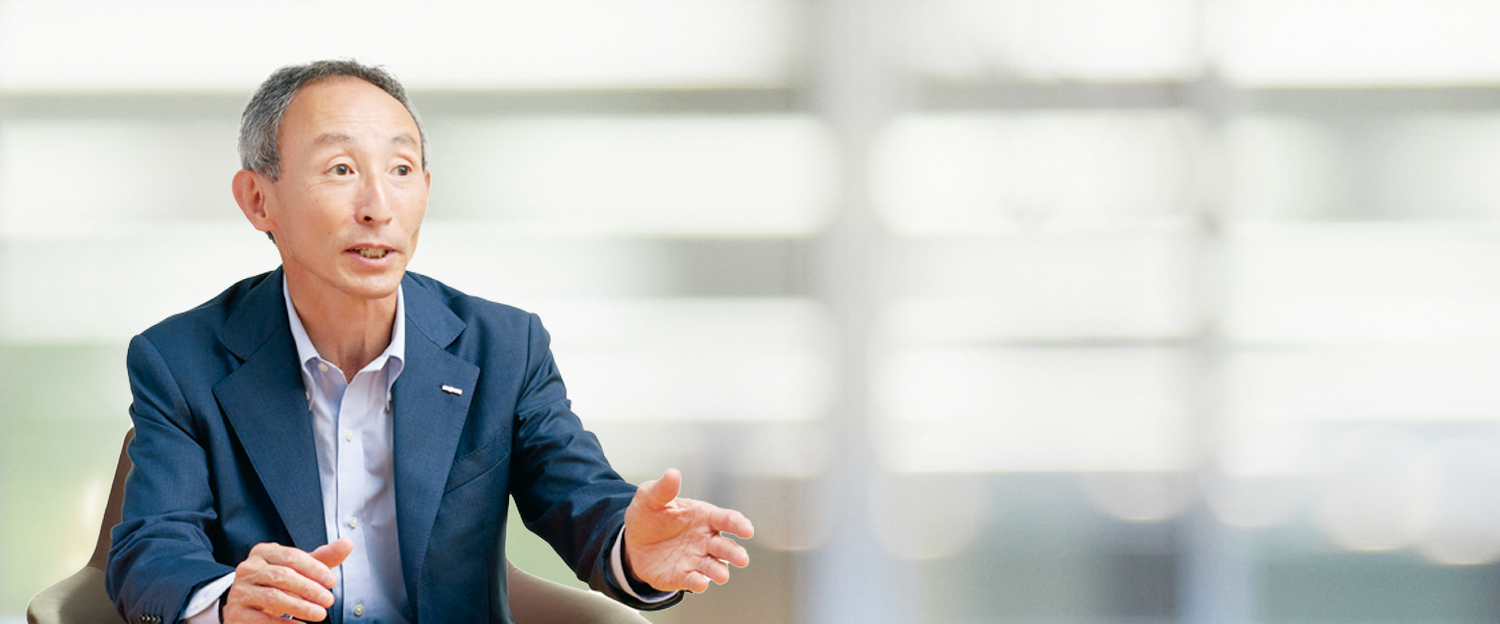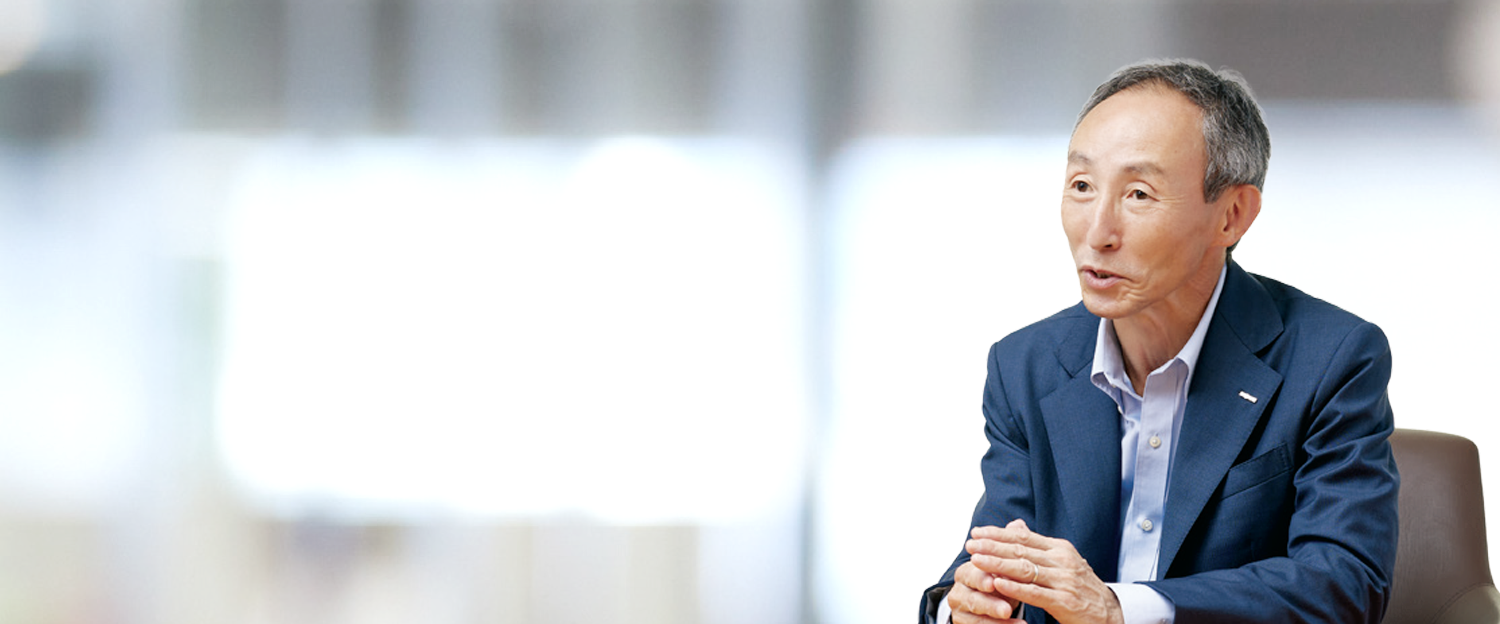Management message

Taking on the challenge of creating new value to achieve our vision
My name is Tatsuya Sato, and I assumed the post of representative director, president and CEO on April 1, 2022.
I have spent most of my professional life overseas, in such countries as in the United States and Germany. In this sense, my experience is unique in J-Oil Mills. With this unique experience, one thing I have always kept in mind is to be prepared to fulfill my responsibilities in any circumstances.
No one can choose the environment they are in. It is important to think hard about how to do our best to deliver results in whatever environment we are placed in. Of course, this does not necessarily mean that we will always get positive results. Regardless of the situation, we need to accept results for what they are, learn from them, and apply them toward the future.
There are two sides to every situation. We can create value by believing in the good aspects and fearlessly taking on challenges, instead of being afraid of the bad aspects and not taking on challenges. Having the courage to step forward and do something that we have never tackled will benefit our company. I recognize that my role is to encourage change in the organization, and that this is what is expected of me by stakeholders and employees alike.
Fats are essential to our daily lives. Taking this at as our starting point, we have defined our value and purpose as being to harness nature’s blessings and draw out its potential to contribute to people’s lives, centered on providing fats essential to our daily lives. We will transcend all boundaries, norms, and limits to come together with our partners and always take on challenges. We will continue to strive to create value for society into the future to achieve our vision as stated in our corporate philosophy, “Joy for Life®: Bringing Joy to the Future by Food.”
Tatsuya Sato
Representative Director, President and CEO
- April 1983 Joined Ajinomoto Co., Inc.
- July 2016 President, Ajinomoto North America, Inc.
- June 2017 Corporate Fellow, Ajinomoto Co., Inc.
- July 2018 General Manager, North America Division, Ajinomoto Co., Inc.
- July 2018 President, Ajinomoto Health and Nutrition North America, Inc.
- June 2019 Corporate Vice President, Ajinomoto Co., Inc.
- April 2021 Senior Managing Executive Officer in charge of Corporate Administration of J-Oil Mills, INC.
- June 2021 Director, J-Oil Mills, INC.
- April 2022 Representative Director, President and CEO, J-Oil Mills, INC. (to present)
Although we are facing a historically challenging business environment, we have no plans to make any major changes to our vision or direction, which is the basis of our Sixth MediumTerm Business Plan.

Toward achieving our corporate philosophy
In April 2021, we established our corporate philosophy, “Joy for Life®: Bringing Joy to the Future by Food,” which expresses our vision, mission, values, and purpose. In addition to the fundamental values that food companies provide, such as good taste and better health, we also take on challenges faced by our customers, society, and the environment from the perspective of reducing impact, with the aim of creating a better society and bringing more joy into the future. However, our corporate philosophy will not spread within the company simply because we established it. We regularly carry out communication activities based on our corporate philosophy, and monitor how much it has permeated among our employees through a quarterly pulse survey. It has been one year since we established our corporate philosophy, and the results show that understanding of our corporate philosophy is spreading among our employees. However, we also found that there are still issues in incorporating our corporate philosophy into business operations, which showed us that our employees are still in the process of internalizing the corporate philosophy.
Our employees need to be on the same page and work together toward the same goal. What can I do to help employees work toward the same goal? Furthermore, what can I do to encourage them to work together? One of the answers I came to based on my experience to date is to engage in “dialogue.” Upon assuming the position of President in April 2022, I decided that my first order of business would be to visit all of our departments and bases. In addition to the head office, I visited as many of our branch offices, sales offices, and factories as I could, and engaged in over 100 different rounds of dialogue.
Through our dialogue, I was reminded that we have a very good long-standing company that has firmly inherited the various innovations produced by our predecessors. We have many excellent employees who are kind, diligent, and hardworking, and each employee has developed their own expertise. On the other hand, I also felt that many employees are reserved and quiet, and do not actively speak up. This is why, as part of our dialogue, I’ve repeatedly told employees that there is no need to be shy, and that we should proactively take on challenges. I’ve also told them that I want them to speak their mind. I find it amazing when we try something new by making a change, and when that change turns out to be positive and starts producing results. My role is to encourage change.
There should be no end to this “dialogue.” This is not something we can stop because we carried out however many dialogue sessions, and it is essential that we continuously communicate. Although our performance in FY2021 was extremely disappointing, I view this difficult time as an opportunity for us to work together toward the same goal, and that all employees must internalize the vision, mission, values, and purpose set forth in our corporate philosophy and work together each day to achieve our goals.
Revised Medium-Term Businness Plan
In May 2022, we announced a revision to our Sixth MediumTerm Business Plan. The business environment has changed significantly since we formulated the plan, and we decided that we needed to revise the plan accordingly. One of the major reasons for the revision is the surge in raw material prices. As well as the growing global demand for vegetable oil for biofuels and the supply-demand crunch caused by a combination of factors, including weather and labor shortages stemming from the COVID-19 pandemic, the invasion of Ukraine by Russia in February 2021 led to a sharp rise in prices for various raw materials, including soybeans, rapeseeds, corn and wheat, which reached all-time highs in March. Furthermore, the Japanese yen has continued to depreciate against the US dollar from around 108 yen per US dollar in April 2021 reflecting rising stock prices and US interest rates due to expectations of a post-pandemic recovery in the US economy and signs of normalization in US monetary policy. The sharp rise in raw material prices and the depreciation of the yen have had a substantial impact, and we expect the outlook to remain uncertain for the foreseeable future.Many people have asked us about our approach to our Sixth Medium-Term Business Plan, as we are facing a historically challenging business environment, but we have no plans to make any major changes to our vision or direction, which is the basis of our medium-term business plan. On the other hand, we must examine what we worked on in FY2021 under this medium-term business plan to go over what went well and what did not, as well as the underlying reasons for the outcomes. Some of our businesses generate a lot of profit, while others do not. As the business environment becomes more challenging, we need to closely review our portfolio, including how to position each of these businesses, with the limited time we have available.
Initiatives for FY2022
Securing stable earnings from the oils and fats business is a high priority in our efforts to improve profitability. The soaring raw material prices driven by the weather and rising global demand are a problem, but the protracted problem between Russia and Ukraine has also highlighted the geopolitical risk of food, and there is already growing concern about supply shortages in Europe, Africa, the Middle East, and other regions. In other words, soaring raw material prices driven by climate change, energy price surge, logistics, and other issues, coupled with the recent global situation, have resulted in a supply-demand crunch for cooking oil itself as well as its raw materials, and this has affected the industry in many different ways.Our company is no exception and has also been affected by this, and we need to mitigate the negative impact as much as we can. In terms of solidifying our earnings base, our response to soaring raw material prices is first and foremost to reduce costs and revise prices, rather than to take unconventional measures. Since the oils and fats business by far accounts for the highest percentage of raw materials in our cost of goods sold, we have no choice but to appropriately reflect raw material price increases in our selling prices. We have asked our customers to accept price revision frequently as the price of raw materials has continued to rise since 2021. So far, we had asked for price revision after raw material prices already rose, which means that we were unable to absorb the cost increase, and we missed our profit targets as a result. In light of this experience, we plan to gradually revise prices to appropriate levels in FY2022 by introducing a pricing formula that shortens the delay between increases in raw material prices and product price revision. Amid the tight supplydemand balance of raw materials and soaring raw material prices, we are fully deliberating and working to fulfill our extremely important social responsibility of ensuring a stable supply of quality products. We are also serious about reducing costs. We are reviewing every department in the company, as well as our production and logistics processes, to ensure that there is no waste or losses. This review has changed the mindset of our employees regarding costs, and through continued efforts we will steadily reduce costs. Moreover, we are also working on digital transformation (DX) initiatives across the company to improve corporate value by focusing on our business, people, and infrastructure.
Meanwhile, we have been stepping up sales of high-valueadded products since the previous medium-term management plan with the aim of boosting stable earnings. In addition to the sharp rise in raw material prices, the spread of COVID-19 has dramatically changed our lives, and the restaurant industry, which is our professional customer base and accounts for a large proportion of our sales, has been particularly affected by the state of emergency declarations and measures to prevent the spread of COVID-19. Under these difficult conditions for our professional customers, we are stepping up proposal efforts for our Cho Toku® series of long-lasting oils to help address their challenges. The Cho Toku® series is positioned as our high-value-added product line, and offers substantial practical benefits by reducing costs and the need to change oil in the kitchen, since it deteriorates less than conventional oil.
The ability to use oil longer contributes to our major goal of creating a sustainable society by reducing the use of raw materials and reducing the environmental impact of the entire supply chain, including transportation, thereby reducing CO2 emissions. Another recent trend in household cooking oils is the narrowing price difference between commodity oils such as canola oil and salad oil and high-value-added products such as olive oil and rice oil. This is partly the result of soaring prices of soybeans and rapeseeds, the raw materials used to make commodity oils, and consumers are becoming more interested in trying out the slightly more premium oil with the smaller price difference. We have seen a similar pattern as well, with sales volume of rice oil increasing. In this way, the impact of the external environment is not unidirectional. While the negative impact of raw material price hikes is certainly substantial for our company, we are also seeing some positive developments in the form of expanded business opportunities. By changing our perspective and shifting our thinking, we should be able to see the challenging environment as our opportunity. We aim to further expand our high-value-added products by accurately capturing customer demand and proactively proposing solutions.
Sustainability initiatives
Today, companies are expected to create social and environmental value on top of economic value. There are a wide range of issues that we need to address, and we are strengthening our business platform while simultaneously focusing on social and environmental value from the perspective of sustainability as part of our growth strategy. We have positioned addressing climate change throughout our supply chain as a top priority, and in February 2022, we merged the Environmental Subcommittee and the Sustainable Procurement Subcommittee, both of which were under the Sustainability Committee, to form the Sustainable Procurement and Environment Subcommittee, thereby strengthening our organization in line with our business model. Furthermore, since November 2020, we have endorsed the Task Force on Climate-related Financial Disclosures’ (TCFD’s) recommendations and have begun to disclose information in line with the TCFD’s recommendations, while also participating in the TCFD consortium. With the aim of preserving the global environment and creating a sustainable society, we plan to reduce plastic waste to zero by 2030, reduce CO2 emissions (Scope 1 and 2) by 50% compared to FY2013, and achieve carbon neutrality by FY2050. In terms of sustainable procurement, we are working to build an environmentally friendly supply chain that respects human rights and ensures quality and safety. In 2020, we established the Human Rights Policy and Palm Oil Procurement Policy and revised our Sustainable Procurement Policy and Standards. Furthermore, in addition to the Roundtable on Sustainable Palm Oil (RSPO), which we have been a member of since 2011, we established our Soybean Procurement Policy in August 2022 to ensure sustainable procurement of soybeans, one of our key raw materials, in an environmentally and human rights-conscious manner, and joined the Round Table on Responsible Soy Association (RTRS).In our business as well, we are strengthening our efforts to create a sustainable society through products that specifically reduce environmental impact. For example, our Smart Green Pack® series of household-use oil products, which use paper cartons, uses more than 60% less plastic than our previous containers, and we expect this to cut CO2 emissions by about over 26%, thereby reducing our environmental impact. More stores are carrying this series of products, partly because customers are becoming increasingly environmentally conscious. Plant-based cheese, Violife, is made from coconut oil and other plant-based ingredients and is free of 28 allergens, making it a safe product for vegans, vegetarians, and those with milk allergies to enjoy eating. In terms of environmental friendliness, CO2 emissions during the life cycle of the plant-based cheese, from production to disposal, are less than 30% compared to dairy cheese sold in Japan, and the land area required is less than 25%. The household plant-based cheese market gained steam after we introduced Violife, growing substantially by approximately 2.3 times, and we expect to see results both in terms of sustainability as well as business. As the need for a sustainable society grows, fulfilling our corporate social responsibility through our business will grow ever more important.
As long as we work together as a group
without fearing change and steadily
work through what we need to do now, the results will surely follow.

Business alliance with Nisshin OilliO Group, Ltd.
Looking at global trends, we see that a food supply crunch is emerging, with rapidly growing demand for food driven by global population growth and the rising crop supply risk stemming from climate change.Moving forward, we can expect to see developments in trade agreements such as the Trans-Pacific Partnership (TPP) and intensifying international competition in securing food resources. However, if we narrow our focus to Japan, the situation is different with demand for food falling in line with a declining population and an aging society with few children. In other words, we are facing opposing situations globally and domestically, and this dichotomy is a challenge not just for us, but for the Japanese food industry as a whole. Under these circumstances, we began exploring ways to ensure a stable supply of oils, fats, and oilseed meal for the future with Nisshin OilliO Group, Ltd. Both companies share the view that we should aggressively promote efforts to achieve the Japanese government’s goal of creating a decarbonized society by 2050, in addition to strengthening our international competitiveness.
Based on this common view, we agreed to form a business alliance in the oil extraction process (crude oil and oilseed meal production), and in May 2021, we began discussions aimed at integrating our domestic oil extraction functions nationwide to build a stable supply system for oil extraction over the long term. In western Japan, we have already begun detailed discussions on establishing an oil extraction company as a joint venture by incorporating oil mills of both companies located in Kurashiki, Okayama Prefecture. We aim to create a next-generation oil extraction plant by consolidating the oil extraction lines of both companies into a single manufacturing company to streamline production, create a system that ensures a stable supply on a sustainable basis, work toward a decarbonized society through innovations in manufacturing technologies, and create a smart factory by leveraging AI and IoT, while consulting with the relevant authorities. The initiatives in this business alliance offer great value from a medium- to long-term perspective, and for this reason we will quickly proceed with our discussions to include other bases going forward.
